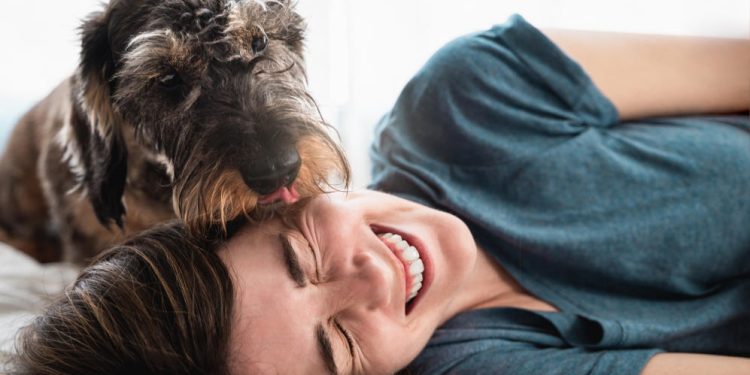A dog’s lick or “kiss” can signify love and affection between you and your pet—at least according to many pet lovers. After all, your furry friend fills your life with joy and comfort, so a bit of drool isn’t that big of a deal, right?
However, you need to consider your health if you have a pet always trying to lick you as a show of affection. Remember that your dog’s tongue has been on the floor, slurping water out of the toilet bowl, or outside in a dirty puddle, or sniffing dead animals, and often, licking their genitals and sniffing their butts. The canine mouth, nose, and muzzle are especially vulnerable to various bacteria. These will then be transferred to your face when your pup comes in for some smooching.
So, what do the experts say? Is it unsafe enough that you need to book a visit to your Brampton dentist and other healthcare professionals?
This article will explore the possible risks of kissing your dog, what is in your furry friend’s mouth, what the dental experts say, and what you can do to lessen contact with germs and bacteria in your pet’s mouth. Let’s delve right into them.
What Is Inside Your Furry Friend’s Mouth?
Given your dog’s behaviour and habits, they can pick up parasites and bacteria that can make you ill. An example of a dog bacteria that can make you sick (or cause death) is Capnocytophaga canimorsus. Experts suggest that up to 3 quarters of healthy dogs harbour this bacteria in their mouths.
Although this will not affect everyone, you are at a higher risk of becoming ill when you have weakened immune systems that have difficulty fighting off infections. You can be someone who’s on medication (like steroids) or have cancer. Dog saliva may also contain Salmonella and E.coli, dangerous bacteria that can cause hookworms and ringworms.
What the Dental Experts Say
Dental health experts like this reliable dentist in Leominster advise keeping pet kisses to a minimum and brushing or flossing your teeth after coming into contact with your pet’s mouth. The parasites and bacteria they can harbour will not boost your immune system, no matter how harmless you think they are.
These parasites and bacteria will cause many intestinal diseases. They can transfer damaging bacteria to your teeth and gums, causing gum disease. Severe gum disease will affect the tissues that support teeth and hold them in place. If you leave these untreated, the jawbone can decay, opening up spaces between the gums and teeth, resulting in tooth loss.
It’s also helpful to discourage your dog from kissing and licking. Otherwise, you must keep a dog’s teeth and mouth clean and healthy. It’s also worth noting that infection can occur from a one-time occurrence or with frequent contact. For more information about keeping your oral health in top shape and protected from your pet’s aggressive licking and kissing, consult a professional, like your family dentist in Oshawa.
What Infections Kissing Your Dogs Will Possibly Transmit
You can (although in rare instances) catch a wide variety of illnesses from kissing your dog on the mouth. Experts say an example is an unpleasant (but usually not too severe) gastrointestinal illness.
Campylobacteriosis is a common infection you can also get from your cats or dogs. Infected animals can transmit the offending bacteria Campylobacter through their stool, whether sick or not. This can cause diarrhea, stomach pain, and fever in humans.
Another infection is due to a microscopic intestinal parasite, giardia, that can cause diarrhea, stomach pain, nausea, gas, and vomiting in cats, dogs, and humans.
What You Can Do Instead
Given how busy your day can be, especially when your nature of work is highly demanding (like requiring you to travel from 1 place to another), there are times when you might neglect giving your dogs the proper care they deserve. These types of care and programs can be offered by companies such as those that provide puppy day care in Etobicoke. Additionally, you can ensure that your pet can be acquainted with other animal friends. They are also well taken care of, from being fed and walked around by dog daycare experts. As a further measure to ensure your dogs have excellent hygiene, try the following:
- Let them have regular deworming programs.
- Consult a local expert for annual pet fecal examinations with appropriate anti-parasite (like fleas and ticks) treatment.
- Feed your dog with cooked, canned, or dry pet food.
- Always wash or cook vegetables for human consumption.
- Thoroughly wash your hands after exposure to feces or fecal contamination.
- Visit your dog’s veterinarian to ensure that they are healthy and clean.
To reiterate, be careful about showing affection to your pets, especially kissing, to avoid developing dental health problems.

























